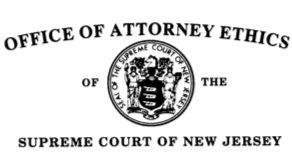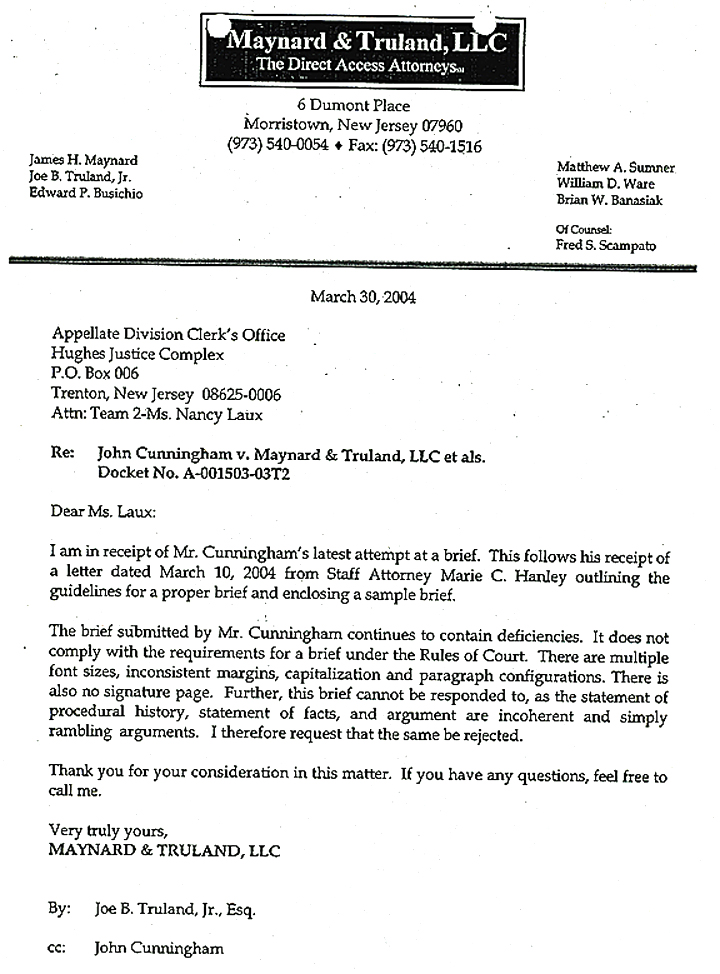On Sunday I introduced you to Jack Cunningham and his rather long and convoluted issue with a New Jersey law firm and Supreme Court of New Jersey. Trust me when I said it took me some time to try and get the time-line and facts right it, really did! Here are some more of the nuances and issues.
Jack’s problem started because of questions about a default. He hired Maynard & Truland in August of 2000 after having received divorce papers that were served (on August 21, 2000) while he was on vacation. His contract with the firm was signed September 6, 2000 and his retainer check was cashed shortly thereafter on September 12, 2000. At the September 6th meeting with Edward Busichio, the attorney he originally met with, Cunningham was assured that he would receive copies of papers filed in response to the divorce papers served to keep a default from being filed against him. Those papers were never filed and he was defaulted by the NJ Superior Court on September 28th. Not knowing what happened in that office, it clearly looks like someone there dropped the ball (from the outside looking in).
Cunningham contacted his attorneys, sending them the notice of default and a letter asking what happened. He received no response from them. Sometime in October, the firm changed the attorney who would represent Cunningham from the divorce attorney, Busichio, to Robert Correale, a general practice attorney. Cunningham wasn’t advised the change took place. October and half of November came and went and there was no communication with Cunningham from the law firm. In fact, no hours were billed against the retainer until November, 2000. Firm invoices show that no work was started until November 14th. Again, someone dropped the ball here and I can’t even begin to see how it could be said to be the fault of Cunningham. Billing him for any hours in fixing the goof is questionable and as a client I would have squawked as well.
On November 23, Cunningham wrote to the firm about their lack of communication and requested that any work done to remove him from default be done without charge due. Reasonable given that their lack of timely response caused it in the first place. By December Cunningham turned to the New Jersey Office of Attorney Ethics for assistance.
Robert Correale was, at that time and for some time thereafter, a member of the District X Attorney Ethics Committee, the same one that would be handling this complaint. On his own firm website, Correale listed himself as “Vice-Chair” of the committee. No action was taken on the complaint, with the exception of a March letter from the State to the committee asking for action to be taken. No mention of any conflict of interest was made.
In the meantime, the default continued, and Cunningham was facing losing custody of his children due to unanswered, and according to Cunningham, untrue allegations of abuse. The stress of this situation and allegations aggravated Cunningham’s PTSD disability. Later in February at an arbitration hearing for the divorce, Correale showed up and was apparently unprepared to adequately represent his client. So much so that his former wife actually wrote a letter to the Court that Cunningham appeared to be representing himself at the arbitration. Clearly if your ex-wife will write that, after a contentious divorce fraught with allegations of child abuse, the weight of the evidence would fall on Cunningham’s side of the claim!
By December of 2002, Maynard & Truland filed suit against Cunningham for an unpaid bill over and above the retainer paid. Cunningham had refused to pay the bill because of the unprofessional and unethical actions, all of which were the subject of the ethics complaint. Cunningham filed a counter complaint for legal malpractice.
In January of 2003, Cunningham contacted the Ethics Fee Arbitration committee, part of the District X Ethics Committee. Correale was still Vice-Chair. No one mentioned the obvious conflict of interest, but did say in a phone call, alleges Cunningham, that“It is not your former law firm’s fault that you have mental problems. Workout a payment plan with them.” The Fee Arbitration Committee denies the calls and comments. Fired up, Cunningham started a letter writing campaign to the Ethics Committee, Office of Attorney Ethics Director David E. Johnson, Governor James McGreevey and the NJ State Attorney General.
Also in the meantime, Correale filed a Certification to answer the ethics complaint. It had issues, but the biggest that I see, as alleged by Cunningham, was that it had absolutely no supporting documentation. Having been a paralegal for 20 years, I can assure you you don’t file documents in court or any other proceedings without supporting documentation … especially when your adversary had PLENTY of written documentation. It makes you look more than questionable. In this case it made the fires of “cover up” and “use of influence” look very applicable.
By March 2003 the collection case came to court, and while a compromise was offered: Correale would drop the outstanding invoice if Cunningham dropped the malpractice suit, Cunningham felt too mistreated to let the malpractice go and refused.
If would have been a good settlement, but I suppose that sometimes you have to stand on principle, and that is exactly what Cunningham did. The shenanigans continued, and there was much more involved, including the tape of the proceedings from the hearing going missing before they were transcribed. 13 years of a mess, in fact.
Here’s my take, and maybe someone can forward this to the lawyers involved: after communicating with Jack Cunningham, I believe that if there was an acknowledgment on the part of Correale, et al, of wrongdoing, negligence and use of undue influence in an effort to make him go away, he would do just that – go away. Maybe a public statement along the lines of “We mishandled his case badly and in an effort to avoid liability behaved badly and we apologize” would appease Cunningham. Then again, maybe not since it appears that several administrations have appeared to collude in this cover up. But sometimes publicly saying “I screwed up and I apologize” is all it takes.
It would at least be a good first step.



